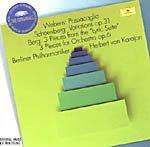These performances, from a 1970’s 4-LP set of Second Viennese School composers, are some of Herbert von Karajan’s finest. Here we find the conductor’s particular idiosyncrasies (extreme dynamic contrasts, emphasis on sonority over movement) perfectly suited to the music (as opposed to works in which he hasn’t a clue, i.e., Schumann symphonies). As some of these works near the century mark, there are still many who find them difficult and impenetrable. Karajan sheds light by bringing all the varied motifs to the surface while maintaining a coherent balance. This is especially so in the Schoenberg Variations, a piece that can sound drearily academic. But here we are consistently compelled to keep listening for the next ingenious orchestral effect. What’s more, Karajan finds real feeling in this music, a quality that is conspicuously absent from Pierre Boulez’s Erato recording, however brilliantly played by the Chicago Symphony.
The Berg Three Pieces for Orchestra is played with a ferocity not found in most interpretations, even James Levine’s excellent Metropolitan Opera Orchestra performance on Sony Classical. The final brass flourish is amazingly detailed. The chilling sound of the Berlin strings in the three Lyric Suite pieces is reminiscent of Bernard Herrmann’s music for the film Psycho. In Webern’s Passacaglia the orchestral timbres are brightly lit and fully fleshed out–from the hushed solo flute in the beginning to the snarling brass at the climax. The original set also included the best-ever performance of Webern’s Six Pieces for Orchestra. So far Deutsche Grammophon has not seen fit to include it in its “Originals” series. Has it been consigned to oblivion? Let’s hope not. The sound, significantly more transparent than on the previous remastering, is not hi-fi in the modern sense, but perfectly suits the character of the performances and makes a terrific impact. Even if you are not new to this music, and especially if you are, this is a must-have.
































